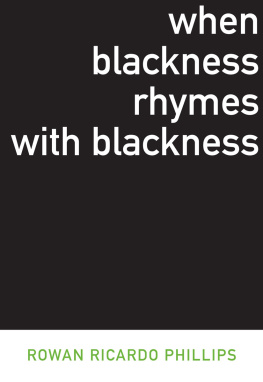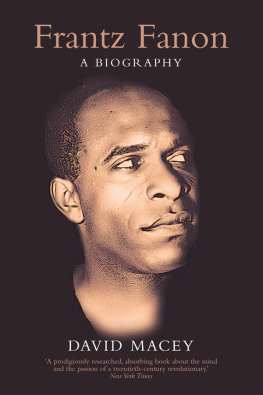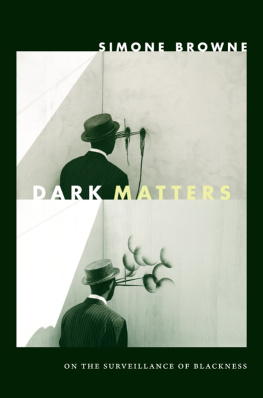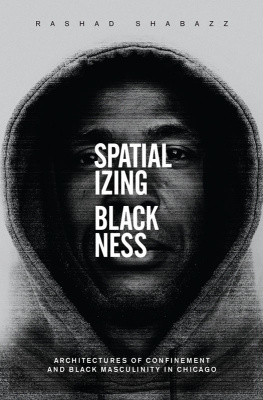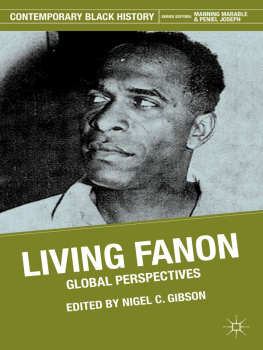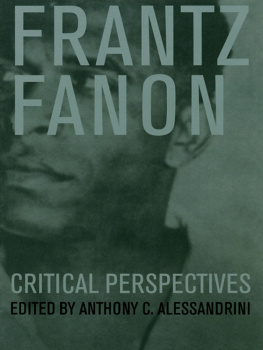Marriott - Whither Fanon?: studies in the blackness of being
Here you can read online Marriott - Whither Fanon?: studies in the blackness of being full text of the book (entire story) in english for free. Download pdf and epub, get meaning, cover and reviews about this ebook. year: 2018, publisher: Stanford University Press, genre: Politics. Description of the work, (preface) as well as reviews are available. Best literature library LitArk.com created for fans of good reading and offers a wide selection of genres:
Romance novel
Science fiction
Adventure
Detective
Science
History
Home and family
Prose
Art
Politics
Computer
Non-fiction
Religion
Business
Children
Humor
Choose a favorite category and find really read worthwhile books. Enjoy immersion in the world of imagination, feel the emotions of the characters or learn something new for yourself, make an fascinating discovery.

Whither Fanon?: studies in the blackness of being: summary, description and annotation
We offer to read an annotation, description, summary or preface (depends on what the author of the book "Whither Fanon?: studies in the blackness of being" wrote himself). If you haven't found the necessary information about the book — write in the comments, we will try to find it.
Whither Fanon?: studies in the blackness of being — read online for free the complete book (whole text) full work
Below is the text of the book, divided by pages. System saving the place of the last page read, allows you to conveniently read the book "Whither Fanon?: studies in the blackness of being" online for free, without having to search again every time where you left off. Put a bookmark, and you can go to the page where you finished reading at any time.
Font size:
Interval:
Bookmark:
Cultural Memory in the Present
Hent de Vries, Editor
WHITHER FANON?
Studies in the Blackness of Being
David Marriott
STANFORD UNIVERSITY PRESS
STANFORD, CALIFORNIA
Stanford University Press
Stanford, California
2018 by the Board of Trustees of the Leland Stanford Junior University.
All rights reserved.
No part of this book may be reproduced or transmitted in any form or by any means, electronic or mechanical, including photocopying and recording, or in any information storage or retrieval system without the prior written permission of Stanford University Press.
Printed in the United States of America on acid-free, archival-quality paper
Library of Congress Cataloging-in-Publication Data
Names: Marriott, D. S., author.
Title: Whither Fanon? : studies in the blackness of being / David Marriott.
Description: Stanford, California : Stanford University Press, 2018. | Series: Cultural memory in the present | Includes bibliographical references and index.
Identifiers: LCCN 2017042249 (print) | LCCN 2018012527 (ebook) | ISBN 9780804798709 (cloth :alk. paper) | ISBN 9781503605725 (pbk. :alk. paper) | ISBN 9781503605732 (ebook)
Subjects: LCSH: Fanon, Frantz, 1925-1961. | Black racePhilosophy. | ImperialismPhilosophy. | Philosophy, West Indian. | Philosophy, Black.
Classification: LCC B1029.F354 (ebook) | LCC B1029.F354 M37 2018 (print) | DDC 199/.729dc23
LC record available at https://lccn.loc.gov/2017042249
Cover design: Rob Ehle
Cover illustration: Wikimedia Commons
Typeset by Bruce Lundquist in 11/13.5 Adobe Garamond
Contents
Foreword
However painful it may be for me to accept this conclusion, I am obliged to state it: For the black man there is only one destiny. And it is white.
FANON, Black Skin, White Masks, trans. Markmann, 10
I resolved to write this book so as to provide a fresh examination of what this destiny might be, but not to affirm it, nor to refuse any of the suffering that comes in its wake, nor to pass off as disavowed an acceptance that Frantz Fanon clearly found so hard to acknowledge. If I were to be asked what this destiny signifies for me here now, writing this sentence, I would have to say at the outset that I do not know; and to that extent it could be said that this destiny is not really readable at all, insofar as the event of its meaning has yet to occur. My aim in this book, far from offering yet another interpretation of what this destiny might be, is to subvert both the ease with which this destiny could be dismissed or affirmed, and the imposition of a prescient point of view from which this destiny could be read or known. By presenting the concepts through which Fanon remains faithful to the difficulty of thinking blackness as a future tense, I have become more and more convinced that to have no certainty of judgment is the only certitude that Fanons conclusion demands.
On the other hand, to see whiteness as the destiny of blackness is to question everything. To see the future of blackness in its absolute disappearance is also to imagine it as a thing obliterated. But what happens to this future whiteness when, blackened, it too learns of its origin? Indeed, for my purposes, Fanons sentence communicates an extreme irony: if the only appearance of whiteness in the world comes from blackness, that raises the question of what it means to desire to see oneself as white or black and to recognize race as a destiny that allows one to grasp ones essence and existence. However painful the discovery, to receive race as a destiny is to forget that race confers no certitude in this world and that the only proof of its meaning is illusion and suffering; to affirm race as a destiny is to deny that it reveals a void and that it is nothing but an ellipsis, or caesura, through which being defends itself against the anguish and ecstasy through which its existence takes shape. The conclusion that race has no immediate knowledge, and can only be approached as the experience of its infinite deferment, is the object of this book. In what follows I am concerned not with a history of that deferment but with the relation between reading Fanon and what I take to be the pessimistic revelation of his thought.
This is not to say simply that race has no significance, but that what it accomplishes as a revelation at each and every moment is repeatable only as its difference from itself. In the same way, if blackness has a destiny, that destiny depends on the discomfort of knowing that its appearance always coincides with self-oblivion, and to that extent its existence is conditional on what remains heterogeneous to it. The plea for race to be a destiny (whether in the idiom of assent or that of obligation) intrinsically has to do with the wretchedness in which blackness came into being in the world and that continues to define the anti-blackness of the world. In saying this, I am not judging the world, nor the dogma by which the world worlds itself as world. I am not questioning the validity of anti-blackness as the content of the world, as if the world could be judged solely according to its hatred of black people. Nor am I asking that blacks be taken as the exception that proves the rule of what it means to be in the world.
But what I am saying is that anti-blackness is the discourse through which a singular experience of the world is constituted. Such experience is not ineffable: anti-blackness is the thing against which the universal, the human, the ideal, etc., is enunciated and created; it is the means through which the racial discourse of being is articulated as spirit. I say being because the essence of anti-blackness is not representation, but the structure by which racial ontology is literally inscribed on each act of enslaved, non-sovereign being. Anti-blackness is thus not the image of that which is excluded from beingeven if that exclusion is always experienced as anguishit is the body, the corpus, the mortis, that has to be cast off for the racial truth of spirit to reveal itself. In this sense, anti-blackness is the bearer of an immanent fault, defect, lapsus at the level of its very being, as Fanon teaches us. This defect is real; it is not imagined, projected, fantasized, etc. What characterizes this flaw, which does not proceed from any actual racist encounter, is that there is no resistance to this outcome by which blackness is suddenly relegated to a debased, decreated form. Why do I say this? For Fanon, blackness can only find its ontological fulfillment by no longer being blackor by entering its own abyssal significance. Now that this book is finished, I see signs of this everywhere, including in myself, and I detest its effects at the same time as I am fascinated by this desire not to be black. But what does it mean for me to say that I am compelled by a desire that forces me to choose between adherence and rejection but that leaves me unable to positively do so, a desire that forces me to suspend decision, without for all that abolishing it?
This book is the narrative of that fascination, the danger it signifies, and its contradictory inner meaning, which I have yet to overcome and whose parody and hypocrisy I continue to perform as if they were a destiny. This is, in a sense, why I believe that Fanons conclusion above is still to be read. This is the whither on which this book is based. In the current discourses of fear and terror, in which the slightest suspicion of a black presence can be steered into mass hysteria and hatred, and all the more readily when the object of distrust hovers uncertainly between the known and the unknown (though we pretend to know who the real enemy is), paranoia and destruction soon teach us that the future will always return in the form of negrophobic malice, in whose aggression black identity is attacked and scorned.
Next pageFont size:
Interval:
Bookmark:
Similar books «Whither Fanon?: studies in the blackness of being»
Look at similar books to Whither Fanon?: studies in the blackness of being. We have selected literature similar in name and meaning in the hope of providing readers with more options to find new, interesting, not yet read works.
Discussion, reviews of the book Whither Fanon?: studies in the blackness of being and just readers' own opinions. Leave your comments, write what you think about the work, its meaning or the main characters. Specify what exactly you liked and what you didn't like, and why you think so.








